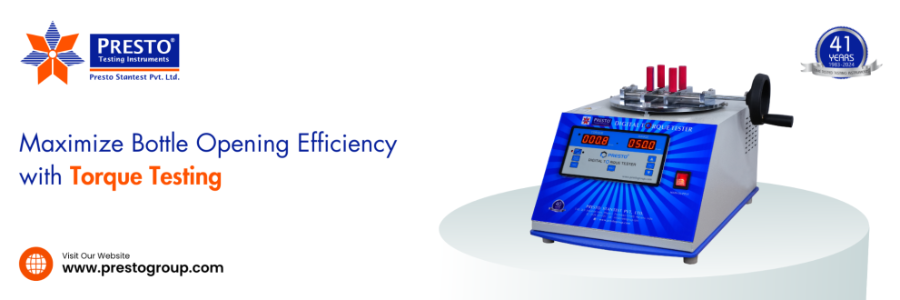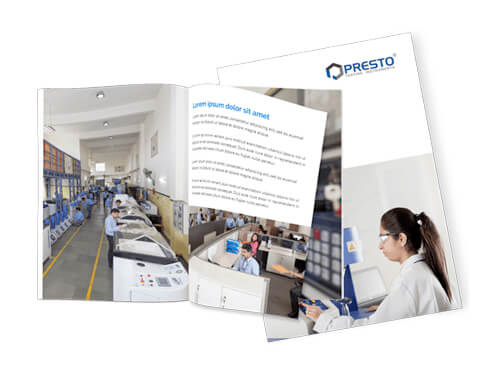Maximize Bottle Opening Efficiency with Torque Testing

Gaurav Malhotra
The correct use of bottle caps is extremely important and integral in the packaging industry as there are numerous kinds of bottles prevailing within the fluid packaging realm. The food & beverages that are served in bottles to the end consumers are tightly packed with the help of bottle closures. These bottle closures are of different types but the most important ones or the most commonly used bottle caps are:
1. Screw caps 2. Flip-top/ Swing-top 3. Tamper-evident cap These caps are used to avoid contamination of the drink packed within these bottles and ensure high levels of insulation within the bottles in order to prevent vacuum leakage as there are numerous aerated drink brands that use these bottle closures to avoid the leakage of fizz which deteriorates the entire drinking experience, hampering the consumer satisfaction levels. As a manufacturer, it becomes the foremost duty to take care of the end consumer’s needs and serve the product accordingly. There are also instances where manufacturers overcompensate for leakage of the fluid or vacuum from the closure due to compromised seal integrity. This also leads to issues faced by consumers in opening the bottle due to which the tendency of a consumer to buy a competitive brand increases, resulting in huge losses to the brand or company. This narrows the margin of error for manufacturers, therefore, these manufacturers undergo torque tests to measure the force required to open bottle closures which helps them ascertain the correct formation 7 integration of the bottle closure & cap. The Presto Group has offered the torque tester – a lab testing instrument that measures the torque generated for opening a bottle closure, allowing the operator & manufacturer of the bottle closure to measure the uncertainties and get rid of them before the product is ready to be utilized by the end customer. The torque tester has now covered a wide range of manufacturers due to its ergonomic body language and a combination of manual yet smooth functioning processes. Functioning Process of the Torque Tester The torque testing machine is designed with utmost precision because it deals with fine margins of error which can cause huge damages 7 jeopardies as these closures are responsible for carrying hazardous chemicals & highly flammable or reactive materials like petrol, diesel, kerosene, etc. The functioning of the torque tester begins with the removal of the safety latch associated with the base plate to limit the movement of the base plate outside the testing procedure, allowing the operator to make sure that the testing is conducted from scratch and without any previous movements. The operator can now place the specimen between the 4 knobs of the instrument. The operator must ensure that the diameter of the base of the instrument does not exceed the distance among the 4 knobs otherwise the clamping of the specimen will not be firm. Afterwards, the specimen is clamped with the 4 knobs as mentioned above. To clamp the specimen the instrument is equipped with a rotary wheel that allows the operator to clamp the specimen single-handedly without any facility. Once the specimen is firmly clamped, the operator can remove the closure of the specimen by bearing hands without using any tool. The force exerted to open the instrument in an angled direction (torque) is indicated on the digital display of the instrument. The determination of the torque of the instrument allows the operator to keep track of all the results achieved with the help of the memory hold button associated with the control panel that keeps track of up to 9 recordings obtained previously, allowing the operator to compare & eradicate uncertainties for better & finer test results. The specifications of the torque tester are extremely important to be adhered to for assessing whether the instrument aligns with the specifications of your specimen or not. Alarming Specifications of the Torque Tester The torque tester is designed to assess the torque required to open flip-top bottle closures, screw caps & tamper-evident bottle/container closures. The instrument is made with zinc/chrome plating along with mild steel material and layered with powder paint for anti-rusting properties. The torque tester supplier has made sure that the instrument is available in variable sizes ranging from 25 lb inch to 100 lb inch. The testing range of the base plate differs from 30 mm to 110 mm as per its own dimensions. The calibration weights provided along with the equipment are 10 lbs & 20 lbs each. The buttons installed within the instrument are feather touch type and indicate peak hold & memory type results. The results of the instruments are showcased by the microprocessor-based digital display attached to it. The tightening clamps are operated by a rotary wheel and are associated with a square shape for clamping the specimen from all 4 directions. This specification of the torque testing machine is extremely necessary to be given a look before getting your hands on the lab testing instrument as there are cases when the specimen of a consumer of lab testing instruments does not align with the requirements and leads to loss for the manufacturer. Book Yourself a Torque Tester Right Away Evaluating the angular force required to open the closures of a bottle or a container has become a necessity for manufacturers due to the new kinds of bottle caps making their way into the market. Along with the new bottle caps, the use of bottle & container closures has also become a lot more prevalent due to their installation over flammable & reactive materials like petrol, kerosene, diesel, acidic chemicals, etc. To avoid leakage of such flammable materials & leakage of fizz in aerated drinks that can cause huge jeopardies & deteriorated consumer satisfaction respectively, you must get yourself a torque testing machine that will determine the torque required to open the bottle & container closures of different types. To know more and ask queries about the instrument, visit our website. Contact us to place an order: Phone no. - +91 9210903903
Recent News
- Paper & Packaging Testing Instruments
- Paint, Plating & Coating Testing Instruments
- Plastic & Polymer Testing Instruments
- Environmental Testing Chambers
- PET & Preform Testing Instruments
- Color Measuring Testing Instruments
- View Entire Range Instruments

Catalogue 2023
Get information about new product launches, research, innovation and endeavors at Presto.
download Free CopyNeed more information
Connect with us for your business enquiries. Generally we respond within one or two working days.
send enquiriesContact Us
Get a Quote
